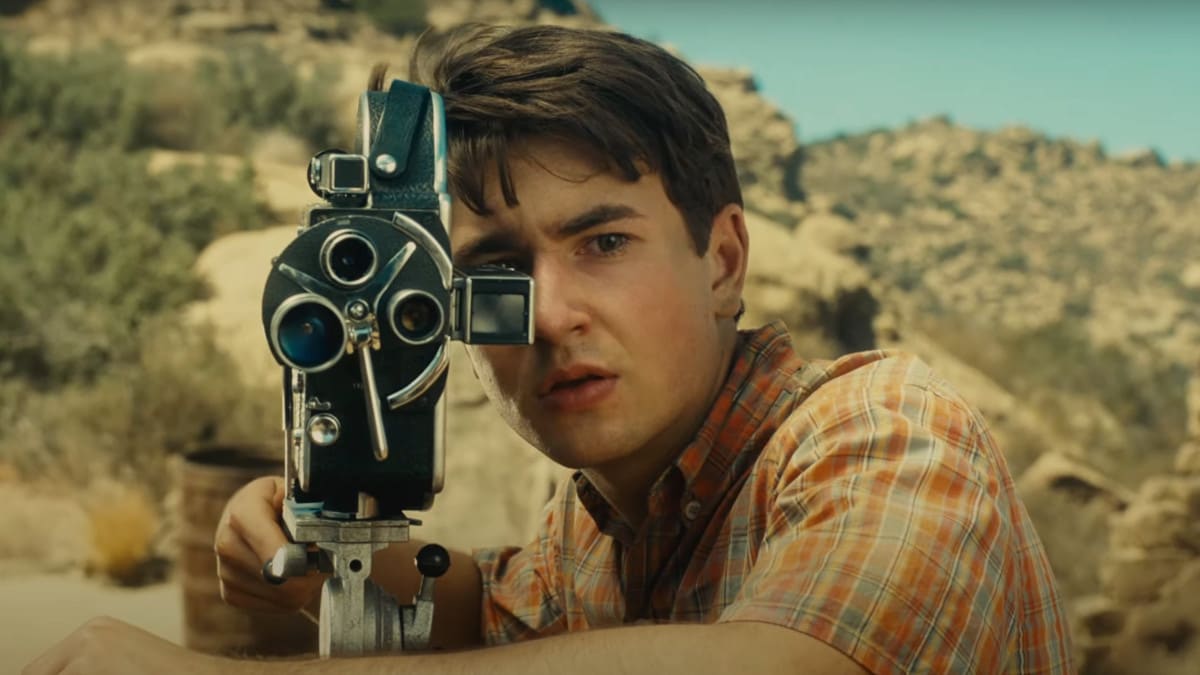
It’s very fitting that Spielberg’s most personal film also happens to be more semi-biographical than a strict biopic. It feels very much like Fellini’s Amarcord, portraying a certain nostalgia that goes beyond just recounting the old days but placing an almost whimsical recollection of what we remember. While Spielberg’s coming-of-age tale does embrace a certain loving memory of the period 50s and 60s, he also doesn’t shy away from the pains of a troubled family and the awkwardness felt by a boy torn between family and art.
The film starts off simply enough by starting with the seed-planting of a budding filmmaker. Sam Fabelman experiences his first movie with his Jewish family, the picture being Cecil B. DeMille’s The Greatest Show on Earth. The most memorable part of the film for young Sam is the train crash. How did they do that, he wonders. It seemed so real and scary. Perhaps replicating it at home could help him better understand.
Aiding in this newfound passion for film is his loving family. His mother Mitzi (Michelle Williams) encourages her boy’s fascination with astonishment for inheriting her love of art. His father Burt (Paul Dano) is much more scientific, with his head firmly in the clouds of electronic innovation. While Mitzi views Sammy’s love of film as a passion while Burt sees it only as a hobby, they offer support in some form and as best as they can. The problem is that they might not be well-equipped to provide a family group effort to support Sammy and his sisters.
The film finds a brilliant balance between the conflict within a chaotic family and the dreams of an artist in the making. As Sammy grows into a teenager (Gabriel LaBelle), he starts to witness the harsher truths of this reality. There’s a battle between the passions he wants to pursue and the wounds of his family that he feels the need to heal. This is brilliantly communicated in the film’s best scene which encapsulates Sammy’s entire journey when he’s confronted by his relative Boris (Judd Hirsch). Boris, being an artist himself, understands the drive Sammy feels as well as the obstacles he faces. Having endured the clash of art and family, Boris gets incredibly blunt and there’s an amazingly sobering moment to it all.
Sammy becomes a likable character because he has a drive and conflicts about the path he wants to pursue. He could push family aside but he doesn’t. He could destroy his cheating and emotionally unstable mother but chooses not to for the sake of some sense of stability. There’s a troublesome but loving nature to this family, where even Burt’s friend Bennie (Seth Rogen) starts fancying Mitzi and there’s still some sense of being desperate not to hurt anyone. Everybody within the Fabelmans just wants to be loved.
Sammy is the most unique member of the family because he has the ability to bring people together. He can transform the antisemitic bully of his high school into an insecure mess with only a well-edited video of the beach. He can bring a smile to his mother’s depressed face with a flash of adventure in his many films. He can make his dad slowly realize that filmmaking is more than just a neat little hobby. It’s that love for creating something which brings joy that makes Sammy continue onward with creating movies.
As one might expect from a semi-autobiographical film such as this, there’s some meta-humor present. Oh, sure, there are the cliche eureka moments where the young Sammy is fascinated by special effects or discovers the perfect way to portray realistic-looking gunshots. But there are also some jabs at bullies demanding not to be placed in a film Sammy makes or correcting the horizon of a shot. All of this leads to the film’s absolutely intoxicating final cameo by a legendary director playing another legendary director. It’s such a fantastic scene that I dare not spoil it here.
Oh, but who could forget the many little moments along the way that make this coming-of-age drama so heartwarming! Watching Sammy go through everything from awkward family dinners to an even more awkward first love of a Jesus freak is so relatable and adorable. If there’s any angle of this retro story that Spielberg slaps on the rose-colored glasses for, it’s these sweet little moments that are so adorable I’m glad the director flips on the 3D glasses to feel that same sense of growing up.
The Fabelmans is one of Spielberg’s best films in a long time and that’s due in no small part to this being a more personal story. The performances all around are fantastic and the building of the family drama is absolutely intoxicating, shot with that familiar Spielberg tone and heart but with a sensation of hurt that feels like it’s coming from someplace deep. This is a film that you could easily see getting the Fanny and Alexander treatment, where the story keeps going for a few more hours just to watch how much further Sammy can go and how much longer his family can maintain this difficult togetherness. For as much as Spielberg tends to get lost in the fantastical or nostalgia, he brings brilliance to this type of story that goes beyond just being a trip down memory lane for one of the finest directors in movie history.

 “My Spy: The Eternal City” Review
“My Spy: The Eternal City” Review  “Deadpool & Wolverine” Review
“Deadpool & Wolverine” Review  “The Boys: Season Four” Review
“The Boys: Season Four” Review  “The American Society of Magical Negroes” Review
“The American Society of Magical Negroes” Review  “Twisters” Review
“Twisters” Review  “Sausage Party: Foodtopia” Review
“Sausage Party: Foodtopia” Review  “Robot Dreams” Review
“Robot Dreams” Review  “Godzilla x Kong: The New Empire” Review
“Godzilla x Kong: The New Empire” Review 


